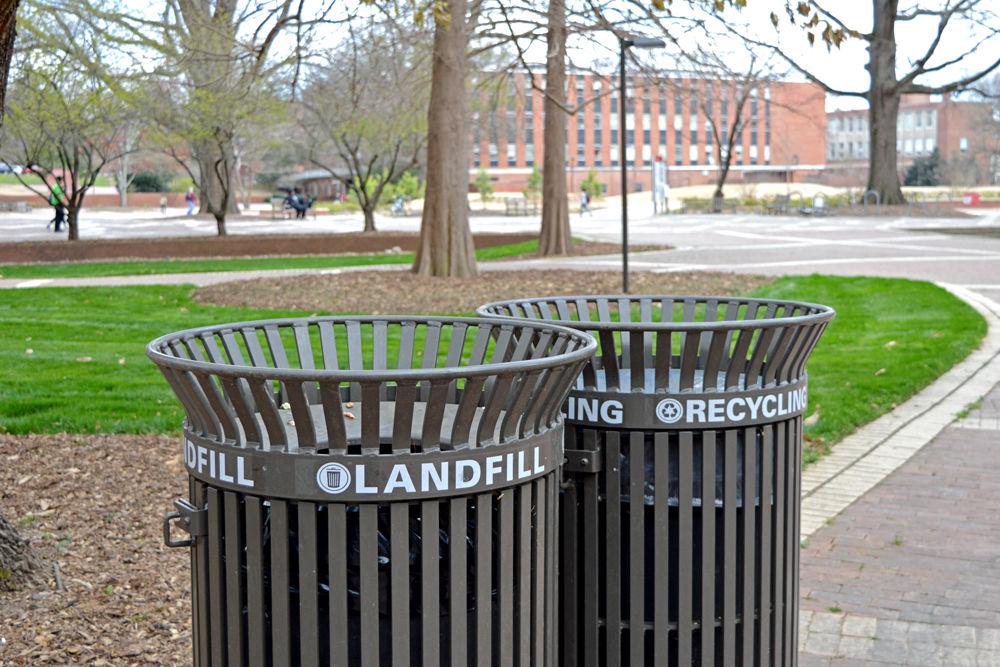
Calla Veazie
Recycling bins are located next to trashcans around campus, providing easy access to recycling.
In the interest of sustainability, NC State and student clubs have created initiatives to encourage a culture of waste reduction around campus.
NC State is currently in the middle of a five-year sustainability plan (2017-2022) to engage the campus community in creating a more sustainable future. This plan contains several sub-goals that collectively bring awareness to this cause.
According to Milannee St. Hill, the outreach coordinator for the Office of Waste Reduction and Recycling, the university views waste as a potential loss of resources.
“Our department is tasked with managing the waste in a responsible way,” St. Hill said. “We have recycling bins everywhere, and the bins are paired. We try to make them as easy as possible and maintain the same standard across the campus, which makes it easy for students to understand.”
St. Hill said that composting is another huge program on campus.
“Our dining halls have been composting back-of-house since 2010,” St. Hill said. “Since 2014-15 we have been expanding composting across campus through development of pizza box composting dumpsters in our residence halls, as pizza boxes cannot be recycled. Students have started initiating and implementing in-room composting in the residence halls.”
Zero Waste Wolves is a student organization that works on waste management on campus.
Kaley Cross, the vice president of Zero Waste Wolves, said that the club started about 18 months ago to work on waste reduction and zero waste education on campus.
“The purpose of the Zero Waste Wolves is to work with campus partners like the waste reduction and recycling office, Talley Student Union, libraries, etc. to find ways to reduce waste on campus,” Cross said. “We also work with other student organizations on campus to educate them as to how they can reduce waste on campus.”
Cross explained that the organization is currently hosting a pilot program from paper towel composting in residence halls.
“For the paper towel composting project, we are being funded by the Sustainability Fund on campus to do that, where we got a grant of about $1000 to do that project,” Cross said.
St. Hill explained that while the Zero Waste Wolves received funding through a sustainability grant to start paper towel composting, the waste management is funded by the university.
“The group has been carrying out training halls in the residence halls on campus focusing on residence halls, which have access to composting dumpsters to allow for all paper towels generated to be taken to composting,” St. Hill said.
Cross said that several big waste management projects have been conducted since the inception of the organization, such as hosting sustainability workshops to promote sustainable living among students.
“We hosted an event last year where we taught people how to make soap,” Cross said. “This year for Earth Month, we are hosting a ‘Sew to Save the Earth’ workshop to teach people how to sew their own facial reusable cotton rounds out of old T-shirts.”
St. Hill explained that the university is working on building its own composting facility.
“We have been able to build our own composting facility and are waiting for final permit,” St. Hill said. “Once we have the permit, we can start managing our compost on site, which would be a true closed-loop system. We are hoping to get it operational within a year.”
St. Hill also shed some light on how the campus managed the huge volume of waste that is generated every day.
“Our office manages all the recycling; we have our own operations,” St. Hill said. “Recycling goes to two material reclamation facilities (MRFs) in Raleigh. Our landfill is taken to a Wake County landfill, and our compost currently is taken to Brooks Contractor, which is based in Goldston, which is one of the few composting facilities that can handle the type and volume of compost we produce.”
According to St. Hill, there are several ways in which students can contribute to waste management on campus.
“First and foremost, students must know what is recyclable and what is not,” St. Hill said. “The information can be found on our website. We are also trying to spread the message that recycling is not based on the product itself as much as it is based on what the MRF can recycle. This is a key factor.”
St. Hill explained that students can also look at the bins, which provide the majority of information on what is recyclable and what is not.
“The most important way in which people can help with waste management is to reduce the waste from the beginning,” St. Hill said. “Recycling cannot solve the waste problems.”
According to St. Hill, shredding and recycling drives take place every year and are open to the public.
“People can bring materials that they want to get shredded along with other waste items such as TVs, plastic bags, etc. to shredding drives,” St. Hill said. “We do presentations for students, staff and faculty. We work closely with other departments which make sustainability a key, [e.g.] athletics. We work closely with several waste management student groups on campus. But the most important thing is that student interest drives waste management.”